- Home
- Lisa Kleypas
Wish List Page 15
Wish List Read online
Page 15
He felt his own body responding to the feel of her skin against his tongue, and to the sound of her quickened breathing. He wanted more than her hand: he wanted much more than any young lady would permit upon such short acquaintance, however bold she tried to be.
If he allowed this to go any further he might truly scare her away, and that was something he was not willing to risk.
He kissed her palm once more, then reluctantly pulled the glove back down her hand. He released her, then gently brushed the back of his fingers against her cheek, as if his hand could kiss her for him.
“Your cousin will be wondering what has become of us,” he said softly.
“Will she?” she asked, as if lost in a dream.
“She will, and she’s likely half-frozen by now, which serves her right for pretending to be hurt.” He stood and helped Vivian to her feet.
“I do not regret that she did. Good gracious,” Vivian said, looking down at her gloved hand. “I had never thought of such a thing happening to my hand.”
He laughed, and laid his own hand over hers in the crook of his arm. He felt hopeful, and giddy with it. A quiet voice warned that it was wisest to go slowly, that it was too soon to know if they were right for one another, but he ignored it.
For this one moment, he would allow himself to hope.
Chapter Five
December 27
The Feast of Saint John the Evangelist
“Vivian, my dear,” Mrs. Twitchen said. “I am so glad to have found you alone.”
Vivian was curled into a corner of a window seat, pillows beneath and around her to ward off the chill through the glass, a book in her lap to make it seem she was otherwise occupied than watching the drive in hopes that Lady Sudley and Mr. Brent might come to call.
Penelope was upstairs, fussing over whether or not to change the trim on her white presentation gown. She had forestalled all her mother’s attempts at speaking on the topic of Mr. Brent, but as Mrs. Twitchen sat herself down on the window seat Vivian felt no quiver of foreboding.
Richard had already explained about Sara and William’s mother, in more detail than Mrs. Twitchen would share. She could understand why Mrs. Twitchen had been concerned, but she thought that she would, in time, be able to overcome the discomfort the thought of that fallen woman brought her.
Jealousy nibbled at her heart when she thought of the woman he had loved and who had given him children who were the center of his world. By his own admission the woman was beautiful and charming, and though he discounted those traits as valueless, she knew she would be tempted to hold herself against them in weak comparison, and to wonder if Richard had any last ember of feeling for the woman.
She would be strong, though; she would not let such thoughts destroy her confidence. It was as Penelope had said: he would value Vivian as Vivian valued herself. She would not let thoughts of the former mistress destroy her chance at happiness.
To let the past eat at her would be to invite a lifetime of distress, if it should happen that she and Richard were to wed. The woman, having not had the good grace to die or move to South America, would be making regular, if infrequent, appearances in Sara’s and William’s lives. Which meant—if Vivian became Mrs. Brent—in her own life, as well.
It was not a pleasant thought.
Neither was it an undigestible thought. There was much she could swallow if it meant becoming Mrs. Brent, and she was almost embarrassed to admit that a fair deal of the persuasion had been done by Richard’s mouth on her hand.
She had relived a dozen times his seduction of her hand, and with each remembrance her body flushed anew with pleasure, her blood warming and tingling in intimate places. She schemed in her mind for how they might next find a private moment together, when he could again take her hand and ravish it.
Or ravish all of her. Let him have her! Then they would have to marry, and she would rush to the prize without having to play all the steps in the game. Only the prize was no longer marriage for the sake of marriage, but was Richard himself.
She saw his tenderness for his children; she saw his vulnerability that he hid behind his blunt words; she saw that his scandalous decisions regarding his children were the only choices that had true honor to them, not the false honor of society. He was a good man, with a true and gentle heart.
And he made her body feel things she would not speak of to Penelope or Mrs. Twitchen for all the cakes in France.
She was so consumed with thoughts of Richard that she had eaten only half the gingerbread on her plate. It sat now in a pool of lemon sauce on the small table with her cold cup of tea.
“Is something amiss?” she asked Mrs. Twitchen, as the woman sat next to her in the window seat. She pulled up her feet to make more space.
“Nothing so far, I do hope, and it is my duty to prevent what I may. Only this is so very awkward and embarrassing, Mr. Brent being a relative of sorts. And from such a good family! One hesitates to say anything against him, yet I feel I must, I simply must warn you away from him.”
“Is it the mother of his children that distresses you?”
“You know about that, then?” the lady asked, surprised.
“He told me himself.”
“Then he told you as well about the other woman, the young lady of good family whom he jilted?”
Vivian sucked in a breath, taken by the same surprise with which one slips and falls on the ice.
“I see he did not,” Mrs. Twitchen said. “Dear me, I do hate telling such tales, and about one almost in my own family! It was a horrible scandal. They were engaged, and he broke it off without explanation. The girl’s father sued for breach of contract, and besides for paying her a settlement Mr. Brent was forced to put an apology accepting all blame in the Gazette. Of course, no one will have anything to do with him now.”
“Surely he had some reason?”
“If he did, he never spoke publicly of it. And who would dare to ask?”
“I can hardly warrant that he is guilty of such a thing,” Vivian said, willing herself to disbelieve.
“Mr. Brent may have kind places in his heart, but that does not mean you can trust him. Men are not always what they seem when they have their eye on a young woman and are pursuing her. Remember, even a tyrant like Napoleon probably had one or two good traits amidst all the rest, and I imagine he could be as charming as any other when he pleased.”
“Mr. Brent does not seem like such a man,” Vivian said faintly, her view of him turned upside down, tumbling away from the image she had built, all her growing affections now in peril of destruction.
“Be careful, my dear,” Mrs. Twitchen said. “My husband and I are in agreement. We don’t want to see you hurt, or what chances you have at making a match ruined.”
“Thank you,” Vivian said.
She spent the remainder of the afternoon staring out the window at nothing. And eating gingerbread.
Chapter Six
December 28
The Feast of the Holy Innocents
The great hall at Haverton rang with the excited shouts and laughter of children. The puppet show had just finished, and now the thirty or so children were going at the sweets and the games. Adults milled among them, imposing the barest sense of order.
“It’s a Sudley tradition on Innocents’ Day,” Penelope said, standing beside Vivian as they observed the chaos. “I remember coming here as a child, myself. All the children of the parish are invited, no matter who their parents might be. Mama never liked me playing with the common children, but it didn’t bother me overmuch that they were present, and really, it was easy enough to stay away from them.”
Watching the children, Vivian thought they showed far less snobbishness than Penelope. The well- and poorly dressed played games and ran around with the same shrieking joy, and those who stuck to their own kind seemed to do so only because they were known friends.
Her eye lit upon Richard keeping an eye on William, who was trying to play with boys larger
than himself. Her heart contracted, and she felt suddenly wistful, wondering what it would have been like to grow up protected by such a loving hand. She had never met a man like Richard Brent, who was so closely involved in the rearing of his children.
Mrs. Twitchen had tried to warn her away from him, and the tale of the jilting preyed upon her mind, adding its weight to the mistress and the children as things she would have to accept, but she had to believe that once she heard Richard’s side, he would prove to have had good reason for his actions.
Surely there must have been good reason? She could not have been so wrong about him, could she?
The tables of sweets beckoned to her, and she excused herself from Penelope and wound her way toward them.
Three or four women guarded the tables, ensuring that greedy fingers did not wreak havoc. They talked among themselves, and nodded their greetings to Vivian as she looked over the goods on offer.
“They’re darlings, but it’s a bit of a madhouse, don’t you think?” someone said beside her.
She turned to see Lady Sudley. “It’s a lovely idea,” she said, feeling a little shy.
“And no doubt every child will go home sick from overeating and excitement.” And then to Sara Brent, who had appeared at her side, reaching for a jam tart, “Sara! Little elf, what are you up to?”
“Papa said I could have some,” Sara said, her hand hovering over the prize.
“Did he? Well, I suppose that’s all right then,” Lady Sudley consented. “Miss Ambrose, this is Sara Brent.”
“Hello, Miss Brent,” Vivian said, waggling her fingers at the girl.
Sara said nothing.
“Sara, Miss Ambrose is going to watch after you for a bit. Do be good for her,” Lady Sudley said. And then to Vivian: “You don’t mind, do you? There is so much for me to oversee…” She trailed off, looking at Vivian expectantly.
“No, not at all,” Vivian agreed.
“Splendid,” Lady Sudley said, and with that the woman glided off.
Sara looked up at her, then grabbed the jam tart and took a bite.
“Is it good?” Vivian asked. If it had been anyone’s child but Richard’s, she would have been at ease, for it would not have mattered if they did or did not like each other. But with this child it did matter, and in consequence she was tense.
Sara nodded.
“Then maybe I’ll have one.” She picked up one of the small plates and put a tart on it. It looked small and alone on the plate. She put another beside it.
Sara watched her with interest.
“What about those things with the sugar on them, do they look good to you?”
Sara chewed her tart and nodded again.
“I think so, too.” She added one to her plate. “The bits with the sausage?”
Sara made a face.
“No, no good, I agree. Who wants sausage when they can have… lemon!”
“I like marchpane,” Sara said.
“So do I! Oh, marchpane is an excellent choice. Will you choose a piece for me?”
Sara complied. “The little cakes are pretty.”
“So they are,” Vivian said. “Which do you think is prettiest?”
They went down the length of two tables, Vivian grabbing a second plate to hold all the treats that Sara chose. The overseeing women gave her questioning looks that she tried to ignore.
“Are you going to eat all that?” Sara asked her in amazement when both small plates were piled high.
“Yes, I believe I will.”
“Papa won’t let me eat so many.”
“I’m a big girl, and I can eat as many as I wish, but maybe I need some help. Would you like to help me?”
Sara nodded and followed her over to some empty chairs. There the girl soon began directing Vivian in which to eat when, and nibbled two or three treats herself.
The plates were nearly empty, and she and the little girl, she thought, were on fine and comfortable terms when Richard found them.
“Papa! Miss A’brose ate this many!” Sara said, holding her two hands out, the fingers spread. “She ate more than Stinky!”
“Stinky?” Vivian asked.
“Our old greedy dog at my house in Wiltshire,” Richard explained.
“Stinky ate my supper, and he ate Willie’s pudding, and he runs around the floor going snort snort snort,” Sara said, imitating the grunting dog. “He’ll eat anything, even green meat—”
“I think Miss Ambrose understands,” Richard interrupted, biting his lip.
“Cook yells at Stinky. He goes to the kitchen and steals things. He’s a very bad dog. He eats horse poo.”
“Oh. Ah. I see,” Vivian said.
“Then he licks my face,” Sara said. “Ewww!”
“But you love Stinky, don’t you?” Richard asked his daughter.
“He smells bad. Can we go home now, Papa?”
“Soon, sweeting. In another week.”
“I’m going to go play now,” Sara said, and slid off her chair.
“Excuse yourself,” Richard reminded the girl.
“Your pardon,” Sara said to Vivian, then the child gave her a quick curtsy and ran off.
“Horse poo?” Vivian said faintly. She had thought she and Sara were getting along so well, and here the girl had been wondering if she would eat horse manure off the ground, given the chance.
“She’s really very fond of Stinky,” Richard said. He sat down beside her, and reached for the one remaining tart on her plate. “May I?”
“Please.” She doubted she would ever be able to eat in public again. And maybe that was for the best.
She felt the questions she needed to ask in the back of her throat, waiting to come out, but couldn’t bring herself to do so just yet. Instead she watched the children as Richard ate the tart. “Sara seems a very bright child,” she said into the brief silence.
“She is, and cheerful. She has enough willful mischief in her that I will have a head of white hair before she is grown and wed.”
“And William?”
“He is quieter, more subdued. He’ll spend his time reading dreary philosophy, I imagine, and have to be pushed to court a girl.”
“He’s a handsome little boy. I think he will set hearts aflutter, if he is brooding and introspective as a man. The young ladies will be unable to resist.”
“Poor little fellow.”
“You don’t think he would enjoy the attention?” she asked.
“Perhaps. He might surprise me.” Richard was quiet for a long moment, his gaze on the playing children. “There are times my heart almost breaks, thinking of them growing up, and suffering the pains the world has to offer. Their hurts now are so small, and so easily soothed compared to what they will endure when they are older.”
“They will have you to help them,” she said, lightly touching his arm and drawing his attention. “And while their hurts may grow greater, so will their strength.”
He laid his hand over hers, on his forearm. “You had to quickly grow strong, didn’t you? When your parents were killed.”
She dropped her eyes, not eager to share that pain that she thought deeply buried, but which at times like this could emerge as easily as if it were just beneath the surface. “That was more than any child should be asked to bear.” She made herself smile, and met his eyes again. “But I survived.”
He lifted her hand off his arm, raised it to his lips, and, heedless of the roomful of people, let his lips graze her knuckles before releasing her. “And you are beautiful in your strength,” he said. The look he gave her seemed to say a million things, all of them new to her and oh so wonderful.
She clasped her hands together in her lap to keep them from trembling, and felt her cheeks and neck heat with embarrassment.
She was falling in love with this man. The realization hit her fully, and it scared her.
She had no experience with romantic love, but she felt herself teetering on its brink, and with her fall would go any last vestige
of sense or practical hesitation. She did not want to ask about the woman he had jilted—she wanted to assume the best of him—but if she was wrong it might be her own heart that would be crushed in reward for her ignorance.
For as she felt her heart opening to love, she felt how very fragile and defenseless it was. She had only herself to guard and protect it.
“I need to ask you a personal question, Richard,” she said. Children still shrieked and played a few feet from them, and she welcomed their presence as a damper against whatever reaction he might have.
“Anything.”
Mrs. Twitchen appeared, forestalling the question. “Vivian, dear, here you are,” she said.
Richard stood, bowing in greeting. “Mrs. Twitchen, a pleasure to see you.”
“Good day, Mr. Brent. You will excuse me if I take my cousin away from you? I fear we must be going.”
“Might I have a few moments?” Vivian asked.
“I’m afraid not, my dear,” Mrs. Twitchen said, and her expression said she would not be dissuaded. “We really must go.”
Vivian had been wrong in thinking she had only herself to guard her heart. Mrs. Twitchen stood before them as resolute as an armored knight, waiting to carry her to safety.
And so, unsatisfied by her lack of answers, yet touched by Mrs. Twitchen’s concern, Vivian made her good-byes.
Chapter Seven
December 31
New Year’s Eve
It had been three days since she had seen Richard, and her body yearned for him as if he were her other half. She had never before understood what people meant when they said such things, but now she did. It was shocking, but she felt ripped in two, and as if she could not rest until he was with her again. His clever words, his gentleness with his children, his honesty—all these things played in her mind and far outstripped all the bad things that had been said about him. She loved him.
Worse, she did not know if he felt the same way. For an hour after leaving Haverton Hall on Innocents’ Day she would have said yes, he did. Yes, he was beginning to care for her as she did for him. But then the doubts had crept in, carried by the unasked, and therefore unanswered, question about the jilted fiancee. Perhaps that girl, too, had thought that he was falling in love with her, and had been surprised to find herself discarded.

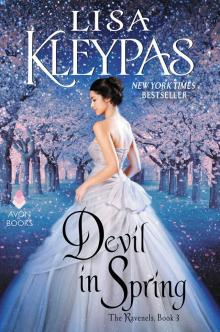 Devil in Spring
Devil in Spring Sugar Daddy
Sugar Daddy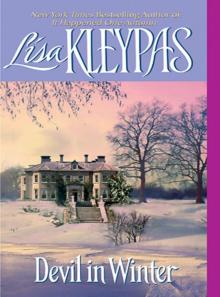 Devil in Winter
Devil in Winter Dreaming of You
Dreaming of You Christmas Eve at Friday Harbor
Christmas Eve at Friday Harbor Love, Come to Me
Love, Come to Me Only With Your Love
Only With Your Love Suddenly You
Suddenly You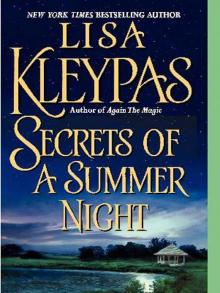 Secrets of a Summer Night
Secrets of a Summer Night Cold-Hearted Rake
Cold-Hearted Rake Where's My Hero?
Where's My Hero? Gifts of Love
Gifts of Love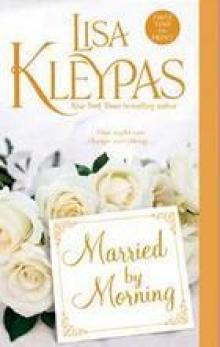 Married by Morning
Married by Morning Then Came You
Then Came You Wish List
Wish List Where Dreams Begin
Where Dreams Begin A Historical Christmas Present
A Historical Christmas Present Somewhere I'll Find You
Somewhere I'll Find You Scandal in Spring
Scandal in Spring Someone to Watch Over Me
Someone to Watch Over Me Worth Any Price
Worth Any Price Prince of Dreams
Prince of Dreams It Happened One Autumn
It Happened One Autumn Love in the Afternoon
Love in the Afternoon Devil's Daughter
Devil's Daughter A Wallflower Christmas
A Wallflower Christmas Tempt Me at Twilight
Tempt Me at Twilight Brown-Eyed Girl
Brown-Eyed Girl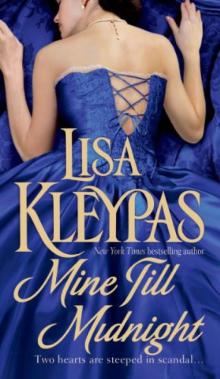 Mine Till Midnight
Mine Till Midnight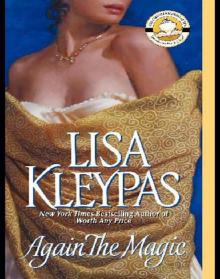 Again the Magic
Again the Magic Lady Sophia's Lover
Lady Sophia's Lover Because You're Mine
Because You're Mine Midnight Angel
Midnight Angel Smooth-Talking Stranger
Smooth-Talking Stranger Blue-Eyed Devil
Blue-Eyed Devil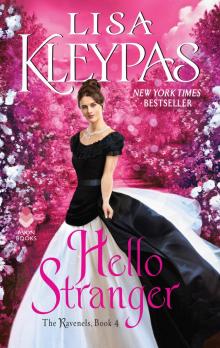 Hello Stranger
Hello Stranger Dream Lake
Dream Lake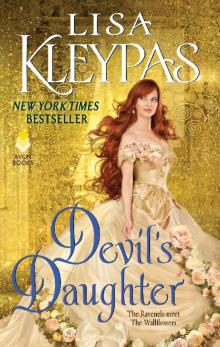 Devil's Daughter: The Ravenels Meet the Wallflowers
Devil's Daughter: The Ravenels Meet the Wallflowers A Christmas to Remember
A Christmas to Remember Smooth Talking Stranger
Smooth Talking Stranger Crystal Cove
Crystal Cove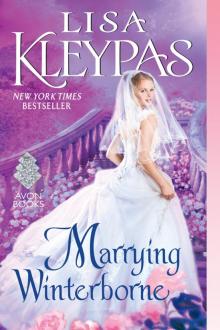 Marrying Winterborne
Marrying Winterborne Stranger in My Arms
Stranger in My Arms Devil in Disguise
Devil in Disguise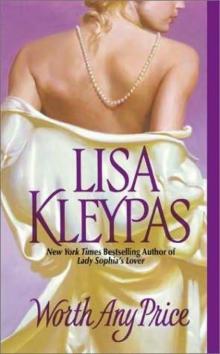 Worth Any Price bsr-3
Worth Any Price bsr-3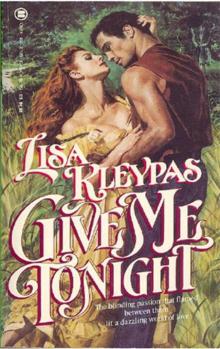 Give Me Tonight
Give Me Tonight Rainshadow Road fh-2
Rainshadow Road fh-2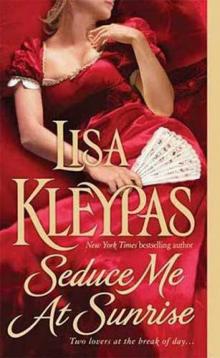 Seduce Me At Sunrise
Seduce Me At Sunrise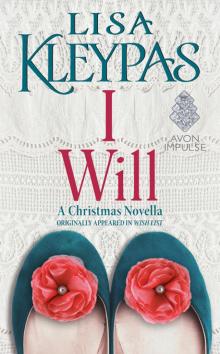 I Will
I Will Someone to Watch Over Me bsr-1
Someone to Watch Over Me bsr-1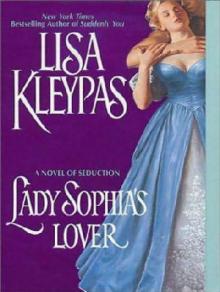 Lady Sophias Lover bsr-2
Lady Sophias Lover bsr-2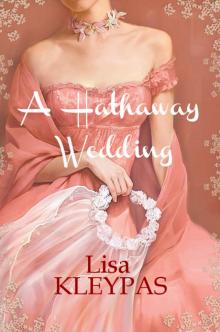 A Hathaway Wedding
A Hathaway Wedding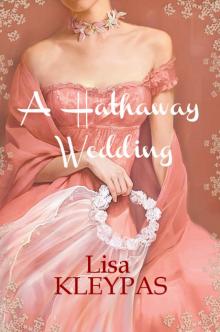 A Hathaway Wedding (Hathaways Bk2.5)
A Hathaway Wedding (Hathaways Bk2.5) Worth Any Price - Bow Street 3
Worth Any Price - Bow Street 3 Christmas with Holly
Christmas with Holly